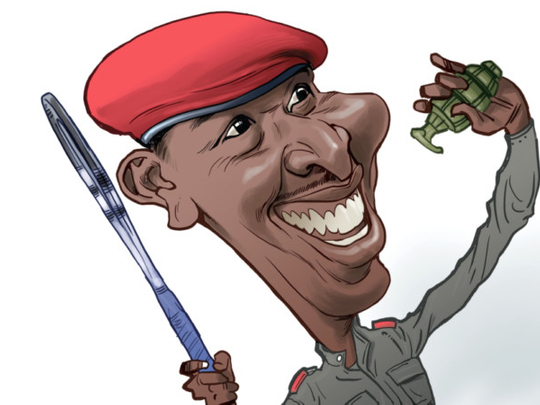
Tucked between a rumbling volcano and Lake Kivu sits the town of Goma, straddling the border between the Democratic Republic of Congo and Rwanda. I have never been to Goma, but my wife has, spending a month there. She was there for the worst of the Hutu-Tutsi slaughter in Rwanda and the spill of humanity into Zaire — her magazine assignment to work as an international aid worker in the squalid camps of the desolate, those with dysentery or the deserters from Rwanda.
She would ride around the camps each morning, collecting the dead bodies of those who died in the night. It was hell, she has always said, a place where life was cheap, death was common and those who were there had lost everything and had nothing except a will to somehow live through the day to see the next.
It was there, in those crowded camps on the side of the rumbling volcano, that Bosco Ntaganda came of age.
If you were young, angry and wanted an outlet to do something or fight back, joining a militia was a matter of survival. He was a fighter and a survivor, joining a militia run by Paul Kagama, now Rwanda’s President.
However, Ntaganda was also special: He had the mindset to kill and had been doing so since he was 17. In Congo, that is not unusual. The writer, Joseph Conrad, referred to it in the 19th Century as “the heart of darkness”. It’s a description still pretty apt, given that for the past ten decades, it has never fully known peace, is corrupt and suffers from rebel gangs and government officials alike who exploit its natural resources and riches to their own ends.
And Ntaganda thrived. After all, life had little value to a man who came of age watching 800,000 Hutus and moderate Tutsis around him die from illness or die in acts of violence at the wrong end of a machete. The means of death mattered little to him, but if you had the means to inflict it, power and money followed.
In the two decades that have passed, Ntaganda’s loyalties shifted like the winds that blow sudden mists down over those lush green hills, where gorillas live and are studied as the legacy of Dr Dian Fossey. He fought with and against national armies, local gangs, regional rebels — anyone and everyone who held sway of this corner of Africa that few elsewhere cared little about.
He became a rich man, a big shark in the small fish tank that is Goma. To those that met him as he held court — both figuratively in the bar of his luxury hotel there or literally in dispensing justice to those who crossed him — he seemed charming enough. Always with a ready smile, but behind that smile a deadly operator who earned the nicknames behind his back: “Terminator Tango” or “The Terminator”.
Rape was a matter of course, murder too. And the children of those who lived in the area were recruited as his child soldiers once old enough to cradle a Kalashnikov.
As one of many civil wars raged, he became rich — and more violent. There was no front line, just series of villages that were plundered and their women taken for entertainment and pleasure back at his luxury hotel. They were the lucky ones.
He was first indicted in 2006 by the International Criminal Court (ICC) for recruiting child soldiers. Charges of rape, murder and ethnic crimes followed later, only when his former boss, Thomas Lubanga, an ex-warlord, was brought before the ICC in 2011.
But for those five years, no one would move against Ntaganda.
As African Union and UN soldiers drove by his Goma hotel, Ntaganda was visible to all, playing tennis. He bribed and threatened those who had the power but lacked the inclination to take him into custody, with his M23 rebels controlling the area.
But for all his power, Ntaganda forgot the law of the jungle — only the fittest survives. For others in his M23 ranks, there was opportunity to carve out a future of their own, earning the riches of power themselves.
In the convulsions of shifting loyalties — greed does make for strange bedfellows — Ntaganda was forced out, heading for the hills with an international indictment hanging over him and dwindling fighters whose loyalties were shifting.
It’s a two-hour drive between the border hills and Kigali. At some stage last week, Ntaganda made the drive, hoping for refuge in a quiet corner of Rwanda, where his former rebel leader now ruled — democratically.
For a nation that has rebuilt itself from its darkest chapter, hosting an ICC suspect was not an option.
After two decades dishing out justice, there was little choice for Ntaganda. But he did so on his own terms — walking into the US Embassy to answer the warrant. If he does end up in the ICC court — and given his brazen ability to subvert justice and government in the past that’s not necessarily a given — it will close a dark chapter on Congo’s sad history. Too bad there are enough such chapters to fill many volumes.








